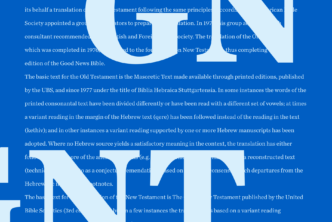You want to learn New Testament Greek? (If the answer’s yes, Dr. John Schwandt’s interactive Greek alphabet course is the place to start to get you going using Greek in Bible study, or his Biblical Greek Foundational Certificate Program.)
Presumably, you’re a Christian, so my advice on this topic will be written for those who desire to love God and neighbor in all they do—even and especially in learning New Testament Greek.
Thinking carefully at the outset about why you want to learn Greek will enrich your study and help ensure that your work is an offering to the Lord.
Here are three reasons not to study Greek—and three to study it.
1. Don’t aim to discover errors in existing translations.
Some wheels need to be reinvented—for example, we need phone batteries that last for weeks rather than hours, and we need them now, people—but English Bible translation is not such a wheel. The level of expertise required to discover genuine errors in major translations is equal to the level required to produce those translations—and you don’t get that level of expertise by aiming for it, anyway. Only love for the study will drive you that far.
When students with two years of Greek under their belts gleefully reveal the “errors” in the NIV, one is justified in rolling one’s eyes like a Chinese journalist.
2. Don’t aim to impress others.
Jesus said that those who do their good works to impress others “have their reward” (Matt 6:2). It’s a terse and powerful phrase on its own. When teaching the text, it does not help you to say something like, “The Greek here is the word misthos, which means—according to the pre-eminent Greek-English lexicon, Bauer-Danker-Arndt-Gingrich—‘recognition (mostly by God) for the moral quality of an action.’” That’s just showing off. It puts you on a pedestal and makes others assume they can’t join you at your altitude of Bible study. If you do that, you have your reward.
If you know how to look up a Greek word in BDAG (it’s as easy as a right-click in Logos), by all means use what you find, but any attempts you make to put your learning on display are likely to backfire. Trust me. Wear your learning lightly, whatever level you’ve reached. You’ll have a better misthos.
3. Don’t aim to discover the “true meaning” of NT Greek words.
Our many excellent Bible translations are not hiding anything. They already tell us, sometimes with a little help from commentaries, the “true meaning” of Bible words. The Greek words in the New Testament mean what our translations and dictionaries say they mean. Studying Greek will not give you access to word meanings everybody else is missing. Don’t enter the quest for Greek with this El Dorado in mind; it’s only a legend.
Now some good motivations.
1. Do aim to know God.
Here’s the ultimate positive goal for studying Greek: knowing God. I never want to suggest that those who don’t know Greek don’t know God, of course. There are Christians whose knowledge of God is far broader and deeper than mine who can’t tell an alpha from an omega.
I also don’t want to spiritualize something that ought to be practical. But how could studying God’s words be merely practical? God has to be the ultimate goal of all our actions; certainly he’s got to be the point of Greek study.
Ideally, knowing Greek gives you a kind of confidence and interpretive precision—confidence because of interpretive precision—that can indeed bring you closer to God than you were before. It’s not an automatic ticket, by any means. But shouldn’t it be this way? Shouldn’t it be that peering ever closer at God’s words bring you ever closer to him? Make this your prayer, and your ultimate motivation, as you study.
2. Do aim to follow the work of commentators.
Some of the most insightful words ever written about the New Testament are found in commentaries. And some of the best of those commentaries aren’t based on English translations; they’re based on the original Greek. And even those that aren’t based on the Greek are inevitably sprinkled with discussions of Greek words. The good news is, not all of these are highly technical; you’ll be surprised how many arguments open up to you when you can just follow along with the words being discussed. Simply being able to read those weird little Greek characters when they’re mentioned in a commentary is freeing. And even an elementary understanding of how the Greek language works will help you follow the arguments of these commentators.
The words Charles Spurgeon gave aspiring preachers over a century ago are still perfectly true:
In order to be able to expound the Scriptures … you will need to be familiar with the commentators: a glorious army, let me tell you, whose acquaintance will be your delight and profit. Of course, you are not such wiseacres as to think or say that you can expound Scripture without assistance from the works of divines and learned men who have laboured before you in the field of exposition. (11)
Some technical commentaries will remain out of reach unless you advance far in Greek. Most commentators today, however, want to sell copies of their volumes—so their work is purposefully designed to be accessible to those who have not achieved expert status. From Andersen on Job to Jobes on 1 Peter, you’ll find that good commentaries on books in both testaments are useful no matter how much language training you have—but more useful if you’ve done some language study.
3. Do aim to eliminate bad interpretive possibilities.
Studying Greek will not increase your understanding of the Bible by ten or even five times. You’ll have just a small percentage increase; you’ll be able to slow down and focus on smaller things in the text.
And, importantly, you’ll decrease the number of minor falsehoods you come to believe in your Bible study. If you teach the Bible to others, this is especially valuable. And it’s especially true if you’ll combine your Greek study with some reading in basic linguistics. The real value in studying Greek is often simply being able to eliminate impossible interpretations, rather than in coming up with the 100% certain one you couldn’t see before.
Conclusion
Only the Bible is worth this kind of attention if you have a full-time job that doesn’t involve biblical scholarship. I don’t care a great deal if I commit basic errors in understanding Dante’s Inferno or even Shakespeare. There’s no way I’m learning medieval Italian (or the very finest points of Elizabethan English!) to increase my proficiency in those texts. But the Bible is worth the effort.
***
Related articles
- Learn Biblical Greek
- A Simple Way to Study Biblical Greek—Whether or Not You Know Greek
- Why I’m Using Logos to Learn Greek—and Loving It
- 6 Resources That Will Help You Learn Biblical Greek and Hebrew
- What Does the Greek Word Logos Mean?
Related resources
- Biblical Greek Foundational Certificate Program
- Basics of Biblical Greek (Workbook) by William D. Mounce
- Basics of Biblical Greek (Video lectures)
- Reading Biblical Greek (Video lectures) by Constantine R. Campbell
- Faithlife Greek Grammar Onthology






